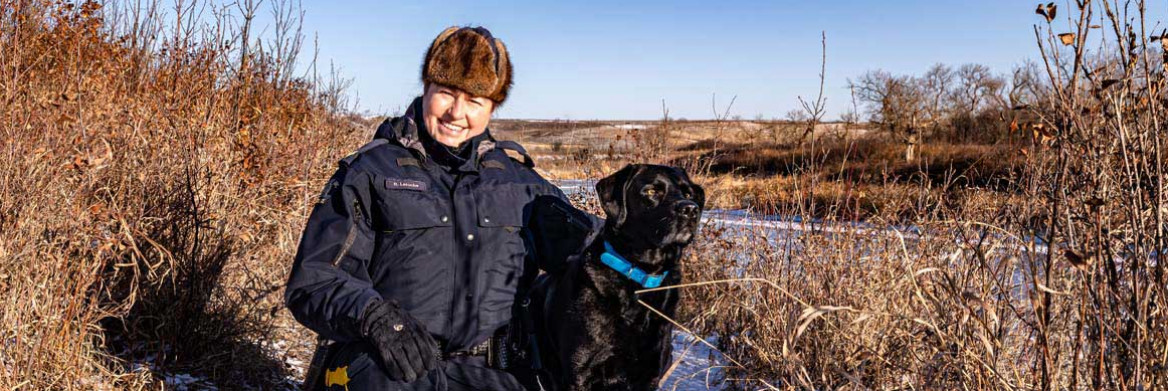Corporal Danielle Laroche joined the RCMP as a civilian member in 2000, working on organized crime and national security files, but she couldn't shake her ambition to become a Mountie. Nine years later, she graduated from Depot and was posted in Alberta before applying for a mission to Haiti. She spoke to Gazette writer Meagan Massad about her overseas experience, and what it taught her about serving her community.
- What made you decide to become to a police officer?
-
In the eight years I was working as a civilian member, becoming an officer was always in the back of my mind. I was fascinated with policing but I thought to myself, 'I'm not G.I. Jane, will I be able to do it?' When I turned 34, my close friend decided she was going to apply as a cadet. It gave me the push I needed to apply.
- What was your experience like at Depot?
-
I learned a lot in my training. I spent an extra 10 weeks at Depot after being 'back-trooped' [moved to a different troop to allow more time for training]. My training ended up taking eight months instead of six months. When you get back-trooped and told your training will be extended, it can be discouraging, because you don't know how much longer you'll have to stay. But I knew that staying to complete my training would be worth it — the RCMP was going to be my career and my future.
- Where did you start your policing career?
-
I was first posted in St. Paul, Alberta, and spent two years there. It was exciting, I drove there across the country with my dog. I then transferred to Peace River, Alberta, and worked there for four years. It was there that I applied for my mission in Haiti.
- How was the application process?
-
The first time I applied for a mission, my detachment commander refused to release me. What I've learned in life is that things don't always happen on the first try. So, I didn't give up, and the following year, with a new detachment commander, I was granted permission. I was initially put on the backup team for a United Nations peacekeeping mission in Haiti. Then I got a call one day telling me that I had three weeks of training before I would leave for Haiti.
- Tell me about your experience in Haiti
-
We would work 60 days in a row with two weeks off, so over time, you start to feel like part of the community and you become attached to the people there.
That experience taught me that if I wanted to help the country, I had to learn about its people first. The reality of any community is that's it's not always what you think until you ask the people who live there. In Canada, there is support and government aid when a disaster hits, but in Haiti they don't have the same resources. When dealing with poverty, natural disasters, and disease, the situation can be life or death.
For example, the nearby community of Jérémie was hit hard by Hurricane Matthew in 2016. It was the first Category 5 storm to hit in Haiti since 2007. In the aftermath, there were trucks pulling up to drop off bags of rice for the community, but it was chaos. People fought to secure a bag of rice so their family would have food. If they stayed in line and waited their turn, they might not get the rice, which meant someone in their family might die.
I've never been put in a position where I had to fight for my life to eat. I learned to understand the emotions that people felt and to relate to their situations in a way I wouldn't have if I had stayed in Canada.
- Is there a memory that stands out for you?
-
Something I will always cherish were our visits to the orphanage. We would go on Sundays and they were the best experiences of my life. I would arrive and the kids would chase after me, braid my hair, and we would sing together. What the kids wanted above all else was affection and quality time. They would never ask for things — maybe shoes from time to time — but they mostly wanted our company. I feel very fortunate to have had that opportunity.
- How do you feel about being a member of the RCMP?
-
I'm so proud of the high standard of policing we offer. I think it's important that RCMP cadets all go to the same place to be trained. I graduated 15 years ago, and I see in the newer cadets the same willingness and pride in their work. It's been the biggest accomplishment of my life.
- What would you say to new recruits?
-
Like I said earlier, I might not be G.I. Jane, but we need all sorts of people in the RCMP. Anybody has the opportunity to thrive because there are so many different jobs. I know it's cliché, but at the end of the day, all I want to do is help people. When cadets have the heart for the job, they will always have a place within the organization.
